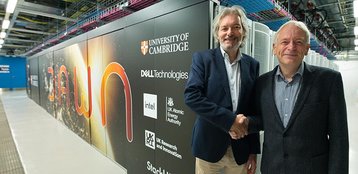The University of Bristol has detailed its upcoming Isambard-AI supercomputer, while the University of Cambridge has announced a new system called Dawn, with the two to be connected.
Isambard AI to offer 200 petaflops
Officially announced this week, the University of Bristol’s National Composites Centre (NCC) will host the Isambard-AI cluster.
HPE will deliver the Cray EX-based system, which will feature 5,448 Nvidia GH200 superchips and offer 200 petaflops Linpack and 21 exaflops of AI compute. The system also will incorporate HPE Slingshot 11 interconnect, and nearly 25 petabytes of storage using the Cray Clusterstor E1000.
It is set to launch in the summer of 2024. Phase one of the £225 million ($273m) system, available in March 2024, will utilize the previously announced Isambard 3 system.
Isambard-AI will be hosted in a self-cooled, self-contained data center, using the HPE Performance Optimized Data Center (POD) at the NCC at the Bristol and Bath Science Park. A heat reuse system will direct waste head to nearby buildings.
The new cluster will be used for AI-based workloads such as training large language models (LLMs), big data, and robotics.
Professor Simon McIntosh-Smith, director of the Isambard National Research Facility at the University of Bristol, said: "Isambard-AI represents a huge leap forward for AI computational power in the UK. Today Isambard-AI would rank within the top 10 fastest supercomputers in the world and, when in operation later in 2024, it will be one of the most powerful AI systems for open science anywhere.
Justin Hotard, EVP and general manager, HPC, AI & Labs at HPE, said: "Today's announcement of the UK's major investment in AI supercomputing underscores its commitment to taking a global leadership position in AI. The Isambard-AI system will harness world-leading supercomputing, including high-performance networking co-developed at HPE's Bristol labs, to provide the performance and scale required for compute-intensive AI projects.”
Announced in May 2023, Isambard-3 will deliver 2.7 petaflops of FP64 peak performance and consume less than 270 kilowatts of power. The system will feature 384 Arm-based Nvidia Grace CPU Superchips.
Darwin comes to Cambridge
Isambard-AI will connect with a new supercomputer cluster at the University of Cambridge, called Dawn.
Details on Dawn are scarce at the minute. The UK government said it will be powered more than 1,000 Intel chips that use water-cooling to reduce power consumption. Cambridge said it was “the fastest AI supercomputer deployed in the UK today.”
The Dell-made cluster will be deployed in two phases; phase one has been installed, with phase two launching next year.
Dr. Paul Calleja, director of Research Computing Services at the University of Cambridge, said: “Dawn Phase 1 represents a huge step forward in AI and simulation capability for the UK, deployed and ready to use now. Dawn was born from an innovative co-design partnership between the University of Cambridge, UKAEA, Dell Technologies, and Intel.”
“The Phase 1 system plays an important role within a larger context, where this co-design activity is hoped to continue, aiming to deliver a Phase 2 supercomputer in 2024 which will boast 10 times the level of performance. If taken forward, Dawn Phase 2 would significantly boost the UK AI capability and continue this successful industry partnership.”
The Cambridge Open Zettascale Lab (originally the Cambridge Open Exascale Lab) was founded in 2020 as a center for research and education.







